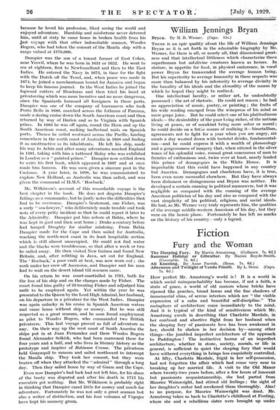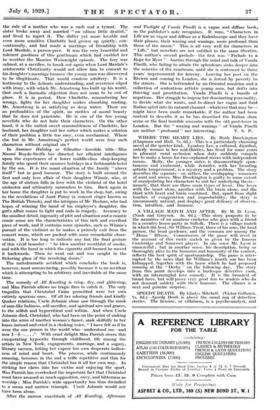Fiction
Fury and the Woman
All Kneeling. By Anne Parrish. (Bonn. 7s. 6d.)
How perfect Mr. Armstrong's world is ! It is a world in which social unimpeachability has become, if not a faith, a state of grace, a world of old manors whose bricks have ripened like peaches, broad lawns and the fine shadows of immemorial elms, of serene interiors which are "the visible expression of a calm and beautiful self-discipline." The metaphors of architecture come immediately to the mind. And it is typical of the kind of sensitiveness which Mr. Armstrong excels in describing that Charlotte Manlale, in her confused and abortive flight from her husband when the sleeping fury of passionate love has been awakened in her, should be shaken in her decision by—among other things—the jumbled imperfect architecture of the approach to Paddington ! The instinctive horror of an imperfect architecture, whether in stone, society, morals, or life in general, is sufficient to quiet the sleeping fury that would have withered everything in beings less exquisitely controlled.
At fifty, Charlotte Mardale, frigid in her self-possession, had not forgotten the affair which had come very near to breaking up her married life. A visit to the Old Manor where twenty-two years before, after a few hours of innocent but passionate acquaintanceship, she had parted from Maurice Wainwright, had stirred old feelings ; the sight of her daughter's suitor had awakened them thoroughly. Alas! to no purpose, for Maurice Wainwright was dead. Mr. Armstrong takes us back to Charlotte's childhood at Fording, where she and a rebellious sister were brought up under the rule of a mother who was a snob and a tyrant. The sister broke away and married " an odious little dentist," and lived to regret it. The duller yet more lovable and even more sensitive Charlotte had grown up quietly, con- ventionally, and had made a marriage of friendship with Lord Mardale, a parson-peer. It was the very beautiful and tolerant goodness of this gentleman which had enabled her to weather the Maurice Wainwright episode. The fury was calmed, at a sacrifice, to break out again when Lord Mardale's aristocratic Christianity would not allow him to consent to his daughter's marriage because the young man was discovered to be illegitimate. That would condone adultery. It is a testimony to the delicate understanding, and reverence edged with irony, with which Mr. Armstrong has built up his world, that such a fantastic objection does not seem to be out of place. It is in period. How Charlotte, remembering her wrongs, fights for her daughter makes absorbing reading. Mr. Armstrong is as satisfying as deep water. There are no profundities of the spirit, no rarities of moral beauty that he does not penetrate. He is one of the few young novelists who do not hate their characters. On the other hand, it is the united sweet reasonableness of Charlotte, her husband, her daughter and her suitor which makes a solution of their problem a little too easy, even mechanical. Where else but in Mr. Armstrong's perfect world were four such characters without original sin ?
In Summer Holiday or Gibraltar—horrible title—Miss Naomi Royde-Smith has directed her efficient intelligence upon the experiences of a lower middle-class shop-keeping family who spend their summer holidays in a fashionable hotel by the sea. It is the usual situation of the family "above itself" but in good humour. The story is built around the first and only love affair of their daughter Winnie, who, at the age of sixteen falls in love with the violinist of the hotel orchestra and ultimately surrenders to him. Back again in her home the daughter is put to work in the shop, but, owing to the revelations of Aunt Pansy (a concert singer known as The British Thrush), and the intrigues of Mr Beelum, who had hopes of winning the hand of his employer's daughter, the girl's affair comes to light and ends in tragedy. Accuracy to the smallest detail, ingenuity of plot and situation and a caustic comic sense are the characteristics of this rich and excellent piece of work, and it contains some episodes, such as Winnie's pursuit of the violinist as he makes a princely exit from the concert room, which are packed with some remarkable obser- vation. It is too long to indicate any but the final gesture of this vivid bounder : "he blew another mouthful of smoke, and with the hand in which the cigarette still burned he waved it ba.ckward.s. Then he went out and was caught in the flickering glass of the revolving doors."
The melodramatic accident which concludes the book is, however, most unconvincing, possibly because it is an accident which is attempting to be arbitrary and inevitable at the same time.
The comedy of All Kneeling is crisp, dry. and glittering, and Miss Parrish allows no tragic fires to catch it. The only tragedies that Christabel Caine permitted were her own entirely spurious ones. Of all her adoring friends and kindly Quaker relations, Uncle Johnnie alone saw through the mask of nun-like holiness, self-sacrifice, and spiritual airs and graces, to the selfish and hypocritical soul within. And when Uncle Johnnie died, Christabel, who had been on the point of sinking into the arms of another woman's fiancé, sank skilfully to her knees instead and cried in a choking voice, "I have felt as if he were the one person in the world who—understood me—and now . . ." With cruel delight Miss Parrish steers this exasperating hypocrite through childhood, life among the artists in New York, engagements, marriage, and a sugary, literary success, letting her expose her own desperate hollow- ness of mind and heart. The process, while continuously amusing, becomes in the end a trifle repetitive and thin for the simple reason that Christabel has it all her own way. In sticking her claws into her victim and enjoying the sport, Miss Parrish has overlooked the important fact that Christabel must have aroused as much oppOsition, envy, and bitterness as worship ; Miss Parrish's wide opportunity has thus dwindled to a mean and narrow triumph. Uncle Johnnie would not have been alone.
After the narrow exactitude of All Kneeling, Afternoon and Twilight of Vanda Pinelli is a vague and diffuse book; as the publisher's note recognizes. It runs, "Characters in Life are as vague and diffuse as a Kaleidoscope and they have their phases, their waxing and wanings, more profound than those of the moon." This is all very well for characters in "Life," but novelists are not entitled to the same liberties. This author's second prelude—the first was "Prelude to a Rope for Myer "—hurries through the mind and talk of Vanda Pinelli, who failing to attain the splendours sinks deeper into the miseries of the courtesan, until she is sentenced to three years' imprisonment for larceny. Leaving her poet on the Riviera and coming to London, she is forced by poverty to the streets. She is befriended by an Oriental musician and a collection of sententious artistic young men, but drifts into thieving and prostitution. Vanda Pinelli is a bundle of negations. Her struggle to impose her dominating personality, to decide what she wants, and to direct her vague and fluid Italian spirit into its natural channel—whatever that may be— might have been made remarkable, if the author had been content to describe it as he has described the Italian slum scene or the final horrible rencontre with the old poet-lover in London. But the "waxing and wanings " of Vanda Pinelli are neither " profound " nor interesting. V. S. P.











































 Previous page
Previous page